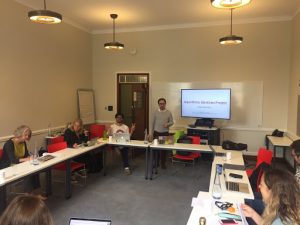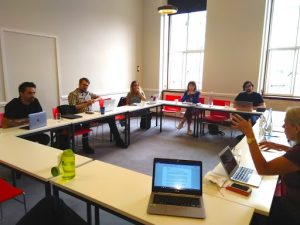On July 9, 2019, the first workshop of the Interdisciplinary Project “Algorithmic Identities: Issues and reactions to the collection of digital data and algorithmic inferences in everyday life” was held at Senate House, the University of London. This project is directed by researchers Martín Tironi, Matías Valderrama and Denis Parra of the Pontifical Catholic University of Chile, in close collaboration with the academics of the Centre for Interdisciplinary Methodologies of the University of Warwick Celia Lury and Scott Wark, who are studying personalisation in digital culture in the project “People Like You: Contemporary figures of Personalisation”. 
The “Algorithmic Identities” project starts from the fact that the Internet and digital innovations of all kinds have opened new ways of configuring, knowing and representing people. If in the ‘90s there was a socio-technical imaginary of the Internet as self-enclosed cyberspace where anonymity and experimentation with multiple virtual identities prevailed, with the growing ubiquity of sensors, smartphones and various algorithms in everyday life, it seems that now we are in a scenario of continuous de- and re-identification and the algorithmic profiling of people. Our identities are increasingly translated into bits of information that are processed to infer and predict individual traits and consumer preferences. Digital platforms such as Google, Spotify or Amazon continually personalise and recommend content and products to us based on complex and commonly inscrutable and opaque algorithmic systems that seek to predict our tastes and desires with great accuracy. In response, artists and activists have problematised the increasing surveillance carried out by these platforms, demanding more data protection regulations and developing tactics to disrupt, obfuscate and resist the technologies of identification and their possible discriminatory or harmful consequences. However, inside this debate, few studies have addressed how people interpret, feel and understand the processes of algorithmic profiling and recommendation, leaving it uncertain how algorithmic systems operate and intervene in everyday life and unclear how people respond to the kinds of subjectivities or individual identities proposed to them by these algorithmic processes.
This project seeks to study how personhood is configured in times of algorithms and digital data. From an interdisciplinary approach at the intersection of computing, sociology and design, the project’s general objective is to analyse how people react and thematise the extraction of digital data and algorithmic predictions about their identity. For this purpose, the project is developing an experimental design intervention, combining a qualitative approach with digital data. Considering the opaque and inscrutable algorithmic systems of large digital platforms, the project will conduct an experimental intervention by designing a prototype of a smartphone app called Big Sister that can collect social media data or free texts uploaded by volunteer participants from Chile and the United Kingdom to provide inferences about personality and cultural preferences. Through an interactive visualization, the volunteer participants will be able to explore their profiles and play with the analysed data. Through in-depth interviews with volunteer participants based on their experiences with the results and algorithmic predictions of the app, we will analyse how people experience, interpret and problematise the daily generation of digital data, enabling a better understanding of how our digitally mediated identities are shaped and staged in contemporary societies.

In the workshop, we had the opportunity to discuss the design and development of the Big Sister app, as well as make methodological decisions about the interviews of digital traces, which will be carried out towards the end of 2019. Along with this, we thought about different ways of conceptualizing personal relationships with data and algorithms, from colonialism to kinship, and future steps of the project were defined, as ways to strengthen our Chilean-British collaboration. To know more details of the research project and stay alert for their news, you can access here: http://plataformasdt.cl/proyectos/identidades-algoritmicas/; and https://peoplelikeyou.ac.uk/.
This project is funded and supported by the “Interdisciplinary Research Competition 2018” of the Vice-Rector for Research (VRI) of the Pontificia Universidad de Chile and the People Like You project, a Collaborative Award in the Medical Humanities and Social Sciences by the Wellcome Trust Foundation, and the Fondecyt project N°1180062: “Datafication of urban environments and individuals: an analysis of the designs, practices and discourses of the production and management of digital data in Chile”.